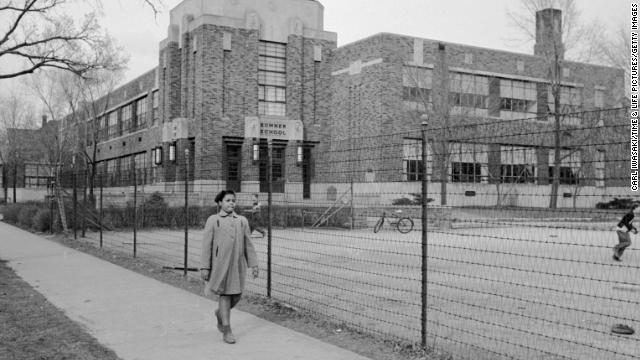Reprinted from CNN.com - Saturday, May 17, 2014
-----------------------------------------------------------------------------------------------------------------------
 Linda Brown, 9,
walks past Sumner Elementary School in Topeka, Kansas, in 1953. Her
enrollment in the all-white school was blocked, leading her family to
bring a lawsuit against the Topeka Board of Education. Four similar
cases were combined with the Brown complaint and presented to the U.S.
Supreme Court as Brown v. Board of Education. The court's landmark ruling on the case on May 17, 1954, led to the desegregation of the U.S. education system.
Linda Brown, 9,
walks past Sumner Elementary School in Topeka, Kansas, in 1953. Her
enrollment in the all-white school was blocked, leading her family to
bring a lawsuit against the Topeka Board of Education. Four similar
cases were combined with the Brown complaint and presented to the U.S.
Supreme Court as Brown v. Board of Education. The court's landmark ruling on the case on May 17, 1954, led to the desegregation of the U.S. education system.
Editor's note: Donna
Brazile, a CNN contributor.
"(CNN) -- On Saturday, we will commemorate the 60th
anniversary of Brown v. Board of Education, the U.S. Supreme Court
decision that outlawed school segregation. Across the country, people
are reflecting on the current state of educational opportunities for
children of color.
In Milwaukee, parents,
educators, students and community members are coming together to support
educational opportunities for young people, and to challenge the
increasing segregation and lack of resources facing young people of
color today. I will join them in that celebration.
But Milwaukee is among the most racially
and economically segregated major metropolitan regions in the country.
It registers the largest discrepancy in employment rates between
African-Americans and whites. Wisconsin has the widest gap in test scores between black and white students.

Donna Brazile
The problems in Milwaukee
and Wisconsin are not unique. In cities across the country, students of
color increasingly attend schools that do not reflect the diversity of
our national community. The biggest metro areas in the Northeast and
Midwest have been epicenters of re-segregation.
In the 1990s and 2000s, school districts across the South, after being
released from Brown-era, court-enforced integration, began
gerrymandering school attendance zones, effectively separating black and
white students.
Today, black students in the South attend majority-black schools at levels not observed for 40 years. In Tuscaloosa, Alabama, for example, nearly one in three black students attends a school that looks like Brown never even happened.
The result is that the achievement gap, which steadily decreased during integration, is widening as re-segregation occurs.
Integrated schools help students achieve academic success in the present and personal success in the future. Students of color
who attended integrated schools in the decades immediately following
Brown were more likely to graduate high school, go to college, earn
higher wages, live healthier lifestyles and not have a criminal record
than their peers in segregated schools. (Diverse schools can also decrease prejudice and teach all students how to navigate an increasingly diverse nation.)
Unfortunately, many
localities are embracing vouchers and charter schools as silver bullets
for addressing persistent achievement gaps. Milwaukee has the largest and oldest voucher school program in the country, which funnels public dollars to private, often sectarian, schools. In 2011, Indiana created the nation's first statewide voucher program, and Louisiana
followed suit in 2012. Charter schools have increased dramatically in
the past decade; from the 1999-2000 school year to the 2010-2011 one, public charter school enrollment increased from 300,000 to 1.8 million.
Vouchers and charter schools just don't live up to the hype. In New Orleans,
students using vouchers to attend private schools have not advanced to
grade-level work any faster during the first two years of the program
than public school students. A recent study found students in voucher schools are performing worse on academic benchmarks than students in Milwaukee Public Schools. And a national study
comparing charter and normal public schools of similar demographics
found that 29% of charter schools reported academic improvements
significantly higher than public schools. Forty percent of charter
schools reported no difference in academic performance, and 31% reported
a performance worse than their public school counterparts.
Sixty years later, "separate and unequal" is still alive.
To fix the problem, we must recognize the problem. First, privatizing our school systems
results in increased segregation, not improved opportunities. Whether
in New Orleans or Philadelphia or Detroit or New York, legislative
schemes perpetuate separate and unequal by privatizing large swaths of
public school districts -- and in some cases, entire districts.
Second, education
doesn't take place in a vacuum. Students and their families need access
to health care, decent wages and affordable housing in integrated
neighborhoods. Thus, Brown's legacy includes economic improvements for
children and families.
Third, neither
high-quality public schools nor economic improvements can occur when
voters are disenfranchised. Only the right to vote protects access to
education and movement toward economic improvement. Yet 34 states
-- most under Republican control -- have passed laws to make it harder
for minorities, the elderly, and young people to vote, including
so-called voter ID laws and regulations that limit early voting.
The economic and racial
inequities that existed 60 years ago persist in our communities today.
They must be addressed. In the spirit of Brown, students, parents and
educators are demanding solutions that go beyond the dysfunctional
"education reforms" and address a wide range of community concerns, from
stopping school privatization to providing universal early childhood
education to raising the minimum wage.
School integration did
not come to be the day after the Brown ruling was issued. Progress took
years, and it took passion, strength and courage from a large group of
committed individuals.
Sixty years after Brown
v. Board of Education, it's time for us to take a hard look at the
separate and unequal conditions that still exist in our schools and our
communities, and rededicate ourselves to fulfilling the promise of equal
opportunity for all."

